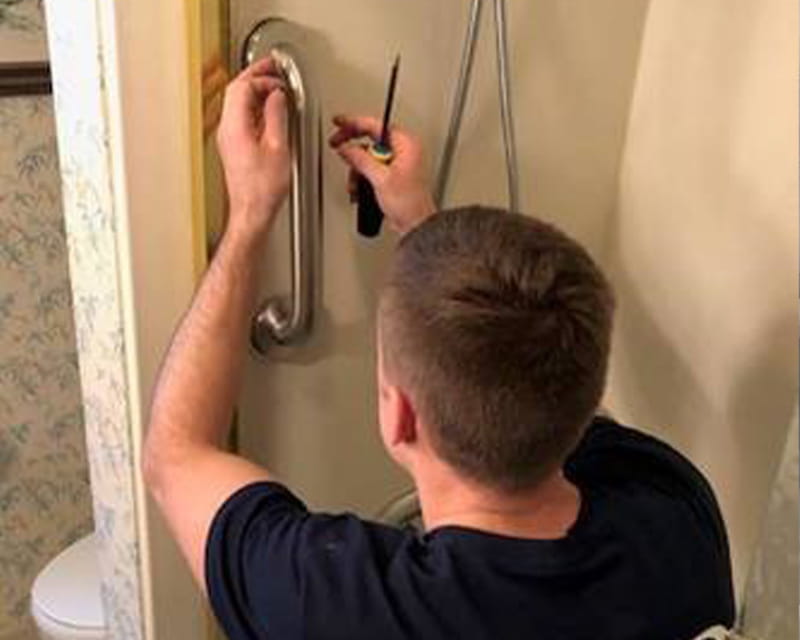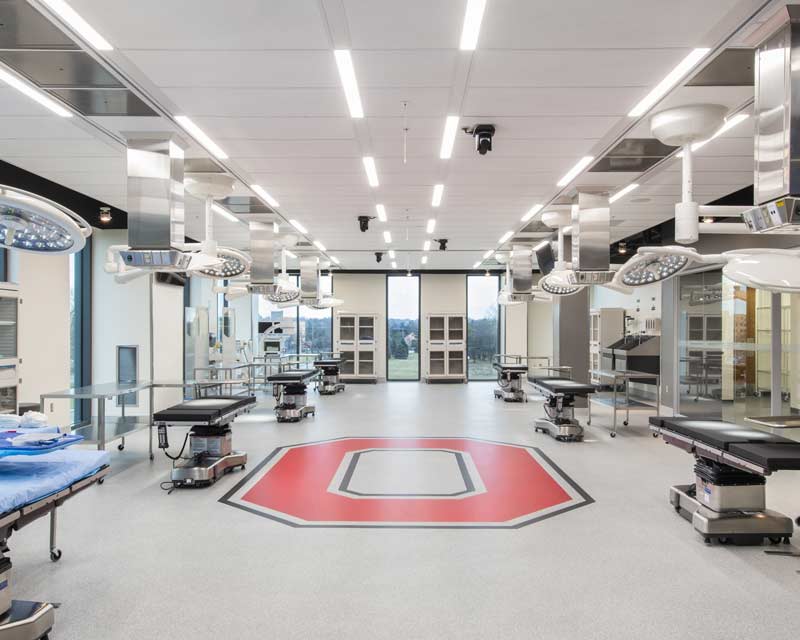
improving patient care
 Students and surgeons can access new hands-on and virtual training resource
Students and surgeons can access new hands-on and virtual training resourceA new surgical skills lab housed within the Jameson Crane Sports Medicine Institute at The Ohio State University Wexner Medical Center provides the most advanced setting for orthopedic educational training and research.
“Our mission is for Ohio State to be a leader in education and surgical training at all levels. From medical students, residents and fellows to existing surgeons who need to learn new skills, this lab provides the most advanced, state-of-the-art opportunities for surgical training,” says orthopedic surgeon David Flanigan, MD. “Furthermore, we will be delivering more training to industry leaders and national and international training components as we expand.”
The 5,000-square-foot lab provides a controlled environment for:
The training venue is becoming a hub for international courses, national industry offerings and institutional partnerships. Ohio State’s Department of Orthopaedics, along with the departments of Plastic and Reconstructive Surgery, Neurologic Surgery, Otolaryngology, Trauma Surgery, Podiatry, Craniomaxillofacial Surgery and Vascular Surgery use the skills lab for simulating challenges across multiple organ systems and surgical specialties.
Funded by Ohio State and business and industry partners, the lab also received more than $5 million in in-kind donations. Flanigan says Ohio State’s orthopedics and sports medicine team is overwhelmed by the number of business and industry partners who believe in their education mission.
Education is part of sports medicine’s three-pronged approach, which also includes a focus on high-quality patient care and research.
“We all know how important surgical skills are to providing excellent, efficient and safe patient care,” Flanigan says. “This lab is for developing anatomical, clinical and surgical skills of all physicians and advanced practice providers.”
The surgical skills lab is designed to:
The lab’s size is “unheard of” for an academic center, Flanigan says. The space is also intentionally beautiful, with plenty of natural light. Often, training labs are in the basement near the morgue, but this site was hand-selected by leadership to highlight all that Ohio State has to offer and create a training center of choice
“We need the ability to train and learn new techniques because we are continually evolving in our surgical practices and we wanted to dedicate a space for that mission in education,” Flanigan says.
Future aspirations include adding virtual reality and assimilation lab components, which will allow faculty to provide training at earlier levels as well as educational opportunities for students and surgeons off site.
The surgical skills lab can train medical students, residents, fellows, advanced practice providers and athletic trainers. We have even provided outreach opportunities for middle and high school students interested in surgical careers, Flanigan says. It’s also set up to train surgeons through in-person workshops and digital streaming.
“We are connected with video links to train across the world, such as with cadaveric surgeries that can be streamed anywhere,” Flanigan says.
The skills lab is used to train for a wide variety of techniques. Some of the orthopedic surgery procedures include:
Industry partners are also using the lab for in-person and virtual trainings, for physicians and their sales forces.
For example, medical device-maker Karl Storz, an in-kind donor to the skills lab, used the space to present its portfolio of endoscopic devices to their sales force and illustrate how to use them.
While the COVID-19 pandemic has slowed down some plans, Flanigan says the goal is to host numerous trainings for community surgeons from any discipline, as well as visiting national and international surgeons.
“We’re looking forward to expanding the lab offerings for programs that help further skills and improve patient care,” Flanigan says.
The research opportunities within the surgical skills lab are vast and include:
The surgical skills lab was part of the American Orthopaedic Society for Sports Medicine’s beta testing study of fellow orthopedic surgery skills. The work assesses how well fellows perform ACL reconstruction and rotator cuff repair.
Flanigan says the research is ongoing. He expects a specific training assessment for sports medicine fellows to become available within the next few years.
The surgical skills training lab also houses the Stealth Lab of Innovation and Collaboration (SLIC).
“We named it strategically because we believe we need to be on the forefront of innovation and technology development and we want to partner with industry in becoming leaders in surgical advancement of procedures,” Flanigan says.